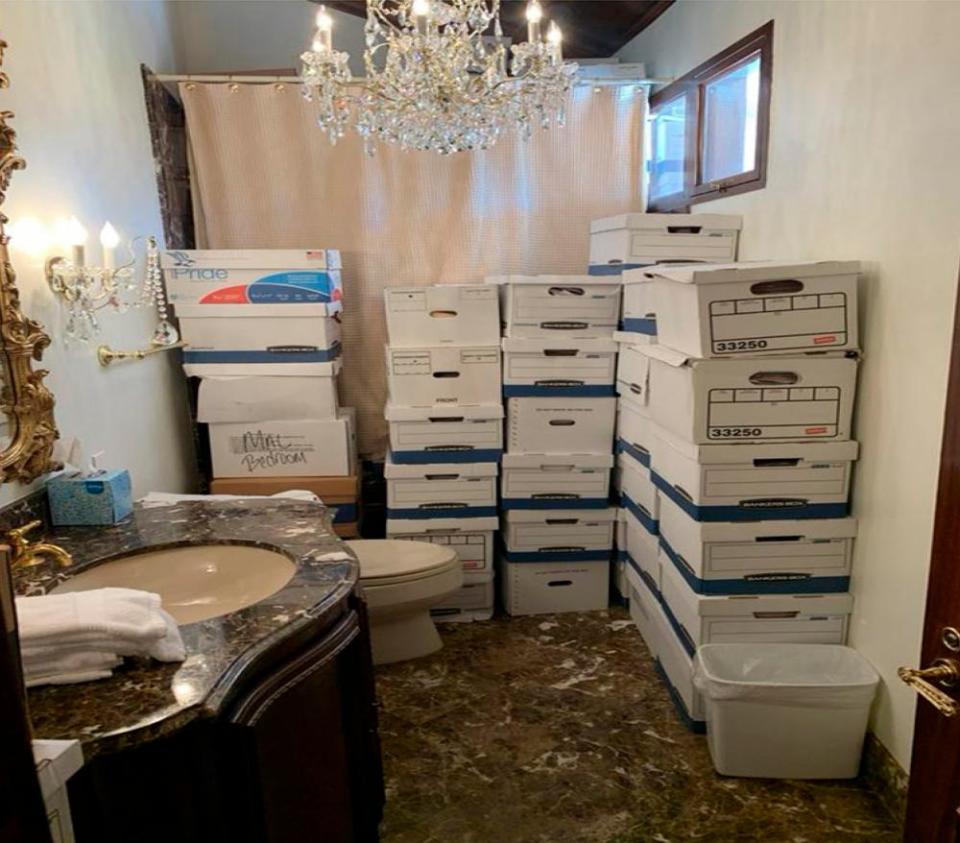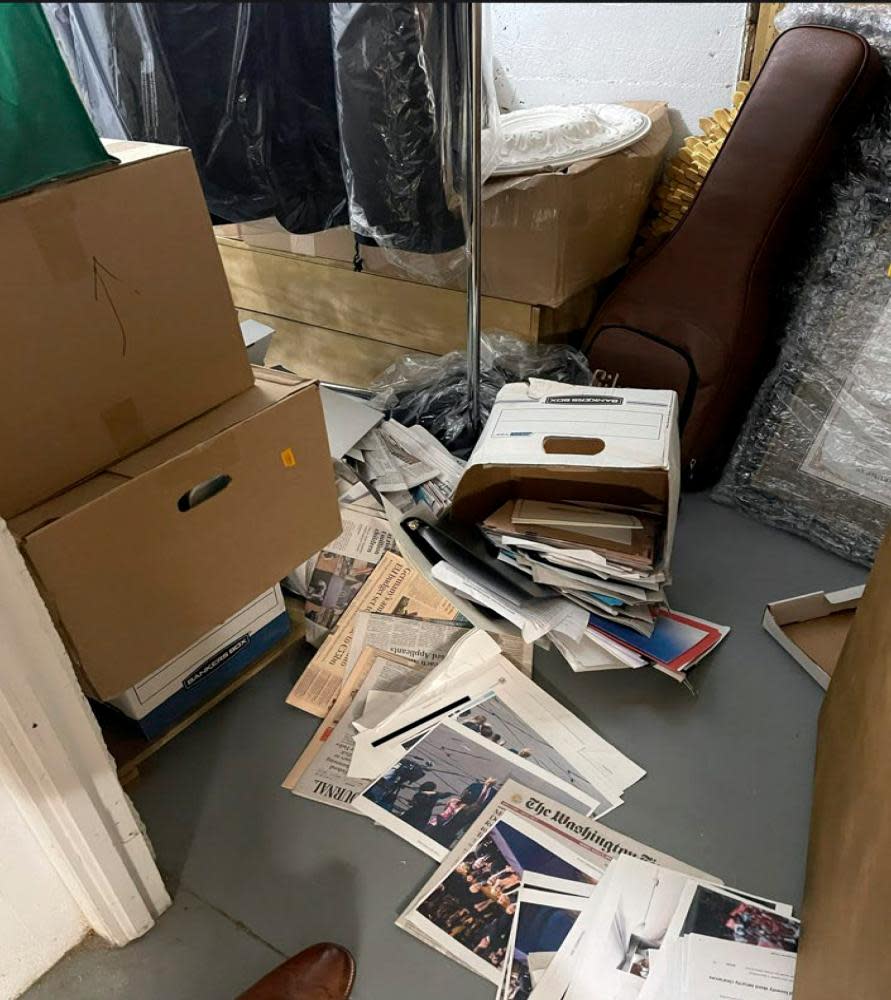Indictment charging Trump with mishandling classified documents unsealed
Donald Trump twice disclosed national security information in separate incidents in 2021 and took steps to retain classified documents that he knew he could not keep because they had been subpoenaed by the justice department, according to the sprawling 37-count indictment unsealed Friday.
The charging papers also revealed Trump hoarded materials of the highest sensitivity after he left the White House, including documents on US nuclear programs, potential military vulnerabilities of the US and allies, and plans for US retaliation in the event of an attack.
The special counsel Jack Smith, who is leading the Mar-a-Lago documents case, said in a brief remark Friday that his office intended to seek “a speedy trial” against Trump, adding that was “consistent with the public interest”. However, Smith did not say exactly when a trial may be possible.
The unsealed indictment named the former president’s valet, Walt Nauta, as a co-defendant, alleging that he entered into a conspiracy with Trump to obstruct justice, withheld documents or records, corruptly concealed documents in a federal investigation, engaged in a scheme to conceal and made false statements.
“The purpose of the conspiracy was for Trump to keep classified documents he has taken with him from the White House and to hide and conceal them from a federal grand jury,” the indictment said.

Federal prosecutors presented evidence that Trump shared materials concerning a US “plan of attack” against Iran at a July 2021 meeting at his Bedminster golf club in New Jersey, where he was recorded urging his guests to read the document while admitting it was “secret” and not declassified.
The second incident in the indictment occurred months later in August or September 2021 when Trump shared a top secret military map with a staffer at his political action committee, but he admitted he should not be showing the map because it was classified and the staffer should not get too close.
Both meetings appeared to demonstrate that Trump knew not only the contents of the documents were related to national defense information, as described in the statute Trump was charged under, but that he also knew he was disseminating their contents to people unauthorized to see them.
The manner in which the material was stored – stuffed in boxes piled up in various locations around Mar-a-Lago including the ballroom, a toilet and the storage room – meant that Trump employees without security clearances were also inadvertently exposed to classified information.
In December 2021, the valet Nauta found that several boxes had toppled over and their contents – including a document marked “SECRET/REL TO USA, FVEY”. The markings indicate the document was releasable only to the Five Eyes intelligence alliance that includes the UK.

Nauta texted another Trump employee: “I opened the door and found this ...” and sent two photos of the spill. One of the photos showed classified information. The employee replied: “Oh no oh no” and “I’m sorry potus had my phone,” using the acronym for the former president.
Prosecutors also presented detailed evidence that Trump moved to obstruct the criminal investigation by concealing classified documents from an attorney identified as his then-lawyer Evan Corcoran after the justice department issued a subpoena last May demanding their return.
The indictment described how days after receiving the subpoena in late May 2022, Corcoran and another lawyer told Trump they needed to search Mar-a-Lago for any documents sought by the subpoena. But, according to the indictment, Trump was resistant.
Trump asked Corcoran something to the effect of “What happens if we just don’t respond at all?” and “Wouldn’t it be better if we just told them we don’t have anything here?”, according to Corcoran’s notes that prosecutors obtained during the investigation.
Ordinarily off limits to prosecutors, the notes ended up before the grand jury in Washington hearing evidence in the case after a US appeals court pierced the attorney-client privilege Trump would otherwise have and ordered Corcoran to turn over his notes. The Guardian has previously revealed some of its contents.
Corcoran then told Trump that he would return on 2 June 2022 to look in the Mar-a-Lago storage room for documents. In the intervening period, the indictment said, Trump instructed Nauta to remove boxes containing classified documents from where Corcoran intended to search.
On 1 June 2022, Trump spoke with Corcoran and asked whether he was still coming to the property. The next morning, Trump spoke with Nauta for 24 seconds. Hours later, Nauta and another Trump employee moved 64 boxes from the storage room to Trump’s residence and returned only 30 boxes.
Later that afternoon, after Nauta had put back some of the boxes, Nauta took Corcoran down to the storage room where he found 38 classified documents. After he finished his search, Trump is said to have asked Corcoran: “Did you find anything? ... Is it bad? Good?”
Corcoran recounted in his notes that Trump also made a “funny motion” when they were discussing whether Corcoran should take the 38 documents back with him to his hotel. As Corcoran described it, Trump seemed to indicate he should “pluck” any documents that were “bad”, without saying it explicitly.
Criminal charges in the Mar-a-Lago documents case deepen the legal peril for Trump, the frontrunner for the 2024 Republican nomination, after he was indicted earlier this year on state charges in New York.
Trump is expected to surrender himself to authorities in Miami – about 70 miles from Mar-a-Lago – on Tuesday at 3pm. Still, he remains a dominant force in the Republican party, easily holding off a wide field of challengers for the party’s nomination to go up against Joe Biden in a battle for the White House next year.

 Yahoo News
Yahoo News 
